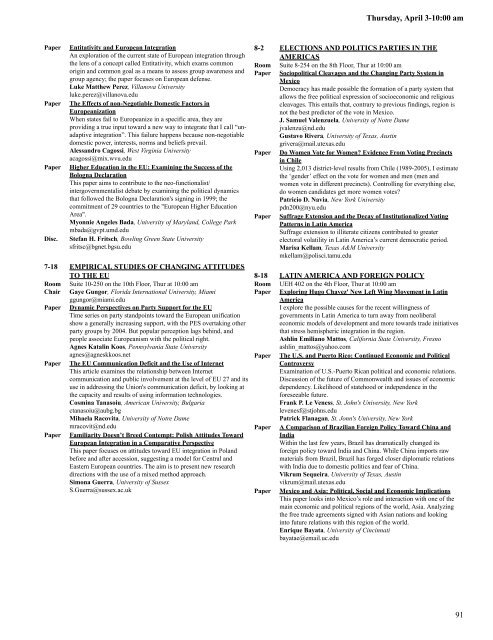2008 Conference Program - Midwest Political Science Association
2008 Conference Program - Midwest Political Science Association
2008 Conference Program - Midwest Political Science Association
Create successful ePaper yourself
Turn your PDF publications into a flip-book with our unique Google optimized e-Paper software.
Thursday, April 3-10:00 am<br />
Paper<br />
Paper<br />
Paper<br />
Disc.<br />
Entitativity and European Integration<br />
An exploration of the current state of European integration through<br />
the lens of a concept called Entitativity, which exams common<br />
origin and common goal as a means to assess group awareness and<br />
group agency; the paper focuses on European defense.<br />
Luke Matthew Perez, Villanova University<br />
luke.perez@villanova.edu<br />
The Effects of non-Negotiable Domestic Factors in<br />
Europeanization<br />
When states fail to Europeanize in a specific area, they are<br />
providing a true input toward a new way to integrate that I call “unadaptive<br />
integration”. This failure happens because non-negotiable<br />
domestic power, interests, norms and beliefs prevail.<br />
Alessandro Cagossi, West Virginia University<br />
acagossi@mix.wvu.edu<br />
Higher Education in the EU: Examining the Success of the<br />
Bologna Declaration<br />
This paper aims to contribute to the neo-functionalist/<br />
intergovernmentalist debate by examining the political dynamics<br />
that followed the Bologna Declaration's signing in 1999; the<br />
commitment of 29 countries to the "European Higher Education<br />
Area".<br />
Myonnie Angeles Bada, University of Maryland, College Park<br />
mbada@gvpt.umd.edu<br />
Stefan H. Fritsch, Bowling Green State University<br />
sfritsc@bgnet.bgsu.edu<br />
7-18 EMPIRICAL STUDIES OF CHANGING ATTITUDES<br />
TO THE EU<br />
Room Suite 10-250 on the 10th Floor, Thur at 10:00 am<br />
Chair Gaye Gungor, Florida International University, Miami<br />
ggungor@miami.edu<br />
Paper Dynamic Perspectives on Party Support for the EU<br />
Time series on party standpoints toward the European unification<br />
show a generally increasing support, with the PES overtaking other<br />
party groups by 2004. But popular perception lags behind, and<br />
people associate Europeanism with the political right.<br />
Agnes Katalin Koos, Pennsylvania State University<br />
agnes@agneskkoos.net<br />
Paper The EU Communication Deficit and the Use of Internet<br />
This article examines the relationship between Internet<br />
communication and public involvement at the level of EU 27 and its<br />
use in addressing the Union's communication deficit, by looking at<br />
the capacity and results of using information technologies.<br />
Cosmina Tanasoiu, American University, Bulgaria<br />
ctanasoiu@aubg.bg<br />
Mihaela Racovita, University of Notre Dame<br />
mracovit@nd.edu<br />
Paper Familiarity Doesn’t Breed Contempt: Polish Attitudes Toward<br />
European Integration in a Comparative Perspective<br />
This paper focuses on attitudes toward EU integration in Poland<br />
before and after accession, suggesting a model for Central and<br />
Eastern European countries. The aim is to present new research<br />
directions with the use of a mixed method approach.<br />
Simona Guerra, University of Sussex<br />
S.Guerra@sussex.ac.uk<br />
8-2 ELECTIONS AND POLITICS PARTIES IN THE<br />
AMERICAS<br />
Room Suite 8-254 on the 8th Floor, Thur at 10:00 am<br />
Paper Sociopolitical Cleavages and the Changing Party System in<br />
Mexico<br />
Democracy has made possible the formation of a party system that<br />
allows the free political expression of socioeconomic and religious<br />
cleavages. This entails that, contrary to previous findings, region is<br />
not the best predictor of the vote in Mexico.<br />
J. Samuel Valenzuela, University of Notre Dame<br />
jvalenzu@nd.edu<br />
Gustavo Rivera, University of Texas, Austin<br />
grivera@mail.utexas.edu<br />
Paper Do Women Vote for Women Evidence From Voting Precincts<br />
in Chile<br />
Using 2,013 district-level results from Chile (1989-2005), I estimate<br />
the ‘gender’ effect on the vote for women and men (men and<br />
women vote in different precincts). Controlling for everything else,<br />
do women candidates get more women votes<br />
Patricio D. Navia, New York University<br />
pdn200@nyu.edu<br />
Paper Suffrage Extension and the Decay of Institutionalized Voting<br />
Patterns in Latin America<br />
Suffrage extension to illiterate citizens contributed to greater<br />
electoral volatility in Latin America’s current democratic period.<br />
Marisa Kellam, Texas A&M University<br />
mkellam@polisci.tamu.edu<br />
8-18 LATIN AMERICA AND FOREIGN POLICY<br />
Room UEH 402 on the 4th Floor, Thur at 10:00 am<br />
Paper Exploring Hugo Chavez' New Left Wing Movement in Latin<br />
America<br />
I explore the possible causes for the recent willingness of<br />
governments in Latin America to turn away from neoliberal<br />
economic models of development and more towards trade initiatives<br />
that stress hemispheric integration in the region.<br />
Ashlin Emiliano Mattos, California State University, Fresno<br />
ashlin_mattos@yahoo.com<br />
Paper The U.S. and Puerto Rico: Continued Economic and <strong>Political</strong><br />
Controversy<br />
Examination of U.S.-Puerto Rican political and economic relations.<br />
Discussion of the future of Commonwealth and issues of economic<br />
dependency. Likelihood of statehood or independence in the<br />
foreseeable future.<br />
Frank P. Le Veness, St. John's University, New York<br />
levenesf@stjohns.edu<br />
Patrick Flanagan, St. Jonn's University, New York<br />
Paper A Comparison of Brazilian Foreign Policy Toward China and<br />
India<br />
Within the last few years, Brazil has dramatically changed its<br />
foreign policy toward India and China. While China imports raw<br />
materials from Brazil, Brazil has forged closer diplomatic relations<br />
with India due to domestic politics and fear of China.<br />
Vikrum Sequeira, University of Texas, Austin<br />
vikrum@mail.utexas.edu<br />
Paper Mexico and Asia: <strong>Political</strong>, Social and Economic Implications<br />
This paper looks into Mexico’s role and interaction with one of the<br />
main economic and political regions of the world, Asia. Analyzing<br />
the free trade agreements signed with Asian nations and looking<br />
into future relations with this region of the world.<br />
Enrique Bayata, University of Cincinnati<br />
bayatae@email.uc.edu<br />
91










